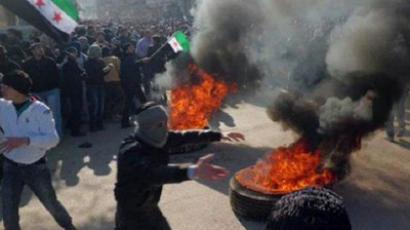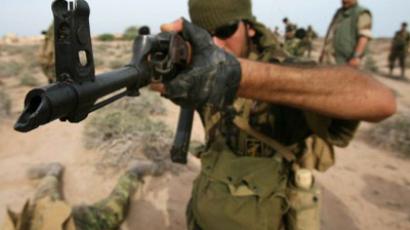Syria rejects new Arab League resolutions
Damascus has rejected the Arab League’s call to bring international peacekeepers into Syria, labeling it a hostile act aimed at undermining security and stability in the country.
An emergency session of foreign ministers of the 22-member Arab League in Cairo has issued a resolution appealing to the UN to bring peacekeeping force into Syria. The international contingent, they insist, should be consisted of UN blue helmets and troops from Arab countries, “to oversee the implementation of a ceasefire.”Meanwhile, the UN General Assembly has opened debate on Syrian crisis.The Arab League Secretary General Nabil El-Arabi proposed to form a new monitoring group for Syria, consisted of international observers of both the UN and the Arab League specialists. He also proposed former foreign minister of Jordan Abdelilah Al-Khatib to be a UN special envoy for Syria, a diplomat that previously worked as a UN special envoy for Libya.Syria's ambassador to Cairo Yusef Ahmed, who did not attend the meeting, said “The Syrian Arab Republic categorically rejects the decisions of the Arab League," reports Xinhua.Syrian diplomat believes this resolution mirrors “hysterics” of the Arab League countries once they failed to secure the UN Security Council's intervention in Syria's affairs. He said the West planned to "redistribute the cards in the region, in order to impose a solution to the Arab-Israeli conflict, resulting in the loss of (Arab) rights and land.”Meanwhile the EU has backed the Arab League proposal and is urging the UN Security Council to stop the violence in Syria.“We welcome these bold decisions and the strong and clear commitment and leadership that the Arab League is taking to resolve the crisis in Syria,” said Michael Mann, spokesman for EU foreign policy chief Catherine Ashton.Moscow says it needs to fully investigate the details of the proposed operation. Russia’s foreign minister Sergey Lavrov stated that a peacekeeping mission can only be deployed in Syria after Damascus agrees to it. Another necessary condition, according to Lavrov, is a ceasefire agreement in the country.Russia’s deputy foreign minister also said that Moscow does not rule out taking part in the peacekeeping operation in Syria if Damascus fully agrees to this mission.On Sunday Syrian special forces resumed an assault on armed militia terrorizing the cities of Homs and Hama. Syrian Ministry of Interior blames terrorist gangs of shelling military checkpoints, government buildings and residential quarters. Terrorists have blown up several private houses in Homs to present it as the result of the governmental forces’ artillery fire on the city.The acts of violence in Syria are not limited to the above mentioned cities only. On Friday a double terror act in then city of Aleppo in Syria’s north took lives of 28 people, both military and civilians, and left 235 wounded.The responsibility for the Aleppo blasts has been taken by the so-called Free Syrian Army.There is a media blackout in Syria and it is very difficult to tell whether or not hundreds of people are being killed and wounded in Syria on a weekly basis, as the activists affiliated with the opposition have a tendency to claim.Syrian rebels have also received a really strong support not just from the Arab League member countries, but from some truly unexpected sources as well. For example, Osama Bin Laden’s successor Ayman al-Zawahri called on Muslims to aid the Syrian rebels.In the meantime, Washington continues to reprise its “Assad-must-go” mantra, saying it is only a matter of time before the Assad government collapses.Having failed to push an obviously regime change resolution on Syria in the UN, America is now preparing to pursue its agenda bypassing the world body and going ahead with intervention into Syria, as RT’s Gayane Chichakyan reports.
RT spoke with James Corbett, editor of the independent news website Corbettreport.com, who thinks the new initiative paves the way for foreign intervention.Corbett believes the only reason is to involve the United Nations, enabling the organization to get a foot on the ground, “in what is essentially at this point a civil war and once the situation spins out of control the only sensible option would be to send in foreign troops which is the real endgame.”














